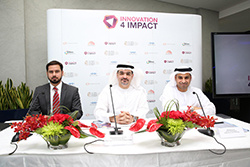 Dubai Silicon Oasis Authority (DSOA) and Thomson Reuters, with support from the Dubai Islamic Economy Development Centre (DIEDC) released the ‘Digital Islamic Economy Report’ for 2015, in collaboration with DinarStandard.
Dubai Silicon Oasis Authority (DSOA) and Thomson Reuters, with support from the Dubai Islamic Economy Development Centre (DIEDC) released the ‘Digital Islamic Economy Report’ for 2015, in collaboration with DinarStandard.
Muslim consumers contributed US$107 billion to global digital economy of nearly US$2 trillion, and their spending will grow faster than the rest of the digital economy by 2020
Results released to support Global Islamic Economy Summit 2015 focusing on Digital Islamic Consumer Services
Launched at a press briefing hosted at the Dubai Technology Entrepreneurship Centre (DTEC), DSOA’s wholly-owned entrepreneurship centre and the largest of its kind in the region, the report serves as a precursor to the second edition of the Global Islamic Economy Summit (GIES) that will be held under the patronage of His Highness Sheikh Mohammed bin Rashid Al Maktoum, Vice President and Prime Minister of the United Arab Emirates and Ruler of Dubai, from October 5 – 6 at Madinat Jumeirah, Dubai, UAE.
Among its key findings, the report estimates that the overall value contributed by Muslim consumers worldwide to the global digital economy in 2014 stood at US$107 billion, representing 5.8% of the total global digital economy. Moreover, the growth in total value of Muslim consumers’ contribution to the global digital economy (at a CAGR of 17% by 2020) is expected to outweigh the growth of the total global digital economy (at a CAGR of 15% by 2020).
The report focuses on a new and a more specialized area of Digital Islamic Consumer Services. Currently, more than 2,000 Islamic lifestyle services are being provided across websites and mobile platforms worldwide. The most popular categories include ‘News and Insights’ (used by 21% of users), followed by ‘Retail Sales’ and ‘Media and Entertainment’. Five segments within Digital Islamic Consumer Services have emerged as the most promising Islamic segments, namely Sharing Economy; Social Commerce; Retail e-Commerce; Food Transportation and Logistics, and Islamic Finance Investment Products.
E-commerce within the modest fashion sector has been identified as the most successful Islamic business model. Modanisa and SefaMerve, the top fashion online retailers, are among the top five leading Islamic consumer websites. The others include Muslima.com, Qiran.com and IslamicOnlineUniversity.com.
Interestingly, the findings indicate that social media services customized for Muslims have proven less successful as business models, especially services pertaining to ‘News & Insights’, which typically rely on revenue support from online advertising. In terms of popularity and usage, the Islamic web and mobile application ‘Muslim Pro’ ranks highest in terms of downloads. Productivity and education apps, as well as apps for Halal food ratings and modest fashion also feature prominently on the Digital Islamic Consumer Services leader board.
Commenting on the significance of the report, Dr Mohammed Alzarooni, Vice Chairman and CEO, Dubai Silicon Oasis Authority, said: “As a leading government entity and key player in the technology industry, the contribution of Dubai Silicon Oasis Authority to this emerging Islamic economy sector will further position Dubai as a hub for the development of electronic information, programs, applications, projects, as well as a platform for e-commerce and Islamic media. Our mandate to support ‘Islamic digital’ and ‘Arabic content’ initiatives is already making considerable headway, given DSOA’s commitment to supporting start-ups engaged in these domains through DTEC. We are confident this report will benefit individuals and businesses targeting the Islamic economy industry by providing data and insights that can serve as a guideline for them to make more informed decisions.”
Nadim Najjar, Managing Director of Thomson Reuters, Middle East and North Africa, said: “The report further reaffirms that Islamic digital economy has indeed become an integral part of everyday life, and indicates significant opportunity for growth in terms of business and innovation. We are confident the insights presented by the report will help entrepreneurs and established businesses better navigate this space.”
Abdulla Mohammed Al Awar, CEO of Dubai Islamic Economy Development Centre, said: “The promise and potential of the Islamic digital economy at the global level is well captured in the report, which offers viable solutions well beyond the typical sectors of banking and finance. We look forward to building our initiatives from this solid research for an enriched business environment to strengthen Dubai’s positioning as the capital of the global Islamic economy.”
The 2015 Global Islamic Economy Summit (GIES), organized by the Dubai Chamber, the Dubai Islamic Economy Development Centre, and Thomson Reuters, is set to gather over 2,000 policymakers, thinkers and business leaders seeking to build a roadmap capitalizing on the opportunities within the growing global Islamic economy.

